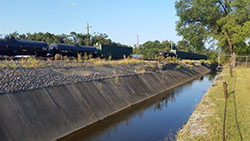United States District Court For the Western District of Virginia
Norfolk Southern Railway Company v. City of Roanoke
Case No.: 7:16-v-cv-00176
Updated: 5/1/19

Jon Mueller/CBF Staff
The Commonwealth of Virginia instituted a program allowing localities the ability to assess fees from landowners, including corporate and individual citizens, to address stormwater carrying pollution that runs into local streams and rivers. As a result, The City of Roanoke established an Ordinance which generates revenue for stormwater management activities. The Ordinance institutes a fee assessment structure based upon the amount of impervious surface identified on improved parcels of land.
Norfolk Southern Railway Company (NSR) filed suit in the U.S. District Court for the Western District of Virginia, on April 12, 2016, seeking a partial exemption from the City's fee assessment. NSR claims the fees are unlawful under the Federal Railroad Revitalization Reform Act of 1976 because railroad tracks are not exempted from the City's Ordinance, but lawns are exempted. NSR also claims that the Ordinance violates the anti-discrimination provisions of the Federal Railroad Reform Act. The City of Roanoke filed a Motion to Dismiss the lawsuit on June 6th.
CBF filed a Motion For Leave to Intervene on July 8th as NSR's suit attacking the fee assessment threatens to challenge an important program by Virginia to fund stormwater management locally and reduce pollutants to the Chesapeake Bay.
A Hearing on CBF's Motion to Intervene was held on September 14, 2016 and on October 19th, the Court Granted CBF's Motion to Intervene under Federal Rules of Civil Procedure 24(b) allowing permissive intervention. As a result, CBF is now an intervenor-defendant in this case supporting the City of Roanoke and the fee assessment.
The Court also heard the City of Roanoke's Motion to Dismiss on September 14th. CBF provided arguments supporting the City's motion. After hearing arguments on both sides, on October 6th, the Court issued an opinion Denying Without Prejudice the Motion to Dismiss filed by the City. However, the Court narrowed the issues to whether the City's stormwater utility fee is a "tax" for purposes of the NSR, and not a fee. In addition, the Court allowed limited discovery on this single issue. The Discovery period closed on March 6, 2017. All parties filed cross motions for summary judgment on April 3rd. The City of Roanoke also renewed its Motion to Dismiss and a Motions Hearing was held on May 15, 2017. During the hearing, the Court instructed the City of Roanoke and CBF to respond to a newly minted argument presented by NSR related to the City's stormwater management system. Briefing on this issue was completed on June 15, 2017. On December 26, 2017 the Honorable Judge Conrad with the U.S District Court Granted the City of Roanoke and Chesapeake Bay Foundation's Motion for Summary Judgment ruling that the utility charge at issue in this case is a fee, rather than a tax. This is an important victory for the Chesapeake Bay as the City's program is designed to ensure proper management of urban stormwater.
On January 11, 2018, Norfolk Southern filed an appeal with the United States Court of Appeals for the Fourth Circuit located in Richmond, Virginia. After briefing was completed, Oral Arguments were held on November 1, 2018. On February 15, 2019, in a win for the Chesapeake Bay, the 4th Circuit issued a Published Opinion upholding the decision of the U.S. District Court requiring that Norfolk Southern pay stormwater utility fees to the City of Roanoke. In a concurring opinion, the Honorable Judge J. Harvie Wilkinson wrote: "Our rivers and estuaries are complex, interconnected ecosystems. It follows, therefore, that efforts to restore them are correspondingly complex and interconnected. Without the cooperation of all levels of government, as well as of private companies and citizens, our waters will continue to be compromised by pollution."
This case is being handled by CBF's Vice President for Litigation, Jon Mueller, litigation staff attorney Brittany Wright, and staff counsel in the Virginia Office.